[Dec 2007, Volume 4 Quarterly Issue] Pdf File size - The IIPM Think ...
[Dec 2007, Volume 4 Quarterly Issue] Pdf File size - The IIPM Think ...
[Dec 2007, Volume 4 Quarterly Issue] Pdf File size - The IIPM Think ...
Create successful ePaper yourself
Turn your PDF publications into a flip-book with our unique Google optimized e-Paper software.
REIMAGINING INDIA<br />
democracy to limit that access to education?<br />
<strong>The</strong> same might be true to<br />
textbooks, foreign faculty, internet<br />
facilities and the like. Limitation of<br />
education trade itself is an abrogation<br />
of human rights.<br />
Universities Would Be Rewarded<br />
Independent Of <strong>The</strong> Public<br />
Good.<br />
Those who oppose would say that universities<br />
should be rewarded for their<br />
research and teaching independent of<br />
their abilities to generate revenue; if<br />
foreign competition were allowed then<br />
Indian universities would have to follow<br />
commercial rather than intellectual<br />
incentives. Those who favor say<br />
that competition is necessary to break<br />
what is now a monopoly. If only low<br />
quality institutions are available, there<br />
is little incentive to imp<br />
rove. Instead of being a threat to intellectual<br />
incentives, foreign comp<br />
etition may be an essential ingredient<br />
to stimulate it.<br />
International Education Trade<br />
Would Weaken <strong>The</strong> Case For<br />
Public Funding<br />
Those who oppose would point out<br />
that public funding is essential for university<br />
development and if foreign<br />
competition were allowed the case for<br />
more public resources would weaken.<br />
‘Let the private sector provide the facilities’,<br />
the politicians might say, ‘Now<br />
we can allocate resources to problems<br />
other than higher education’. Those<br />
who favor argue the opposite. <strong>The</strong>y say<br />
that foreign competition would<br />
strengthen the case for public funding,<br />
not weaken it. It would strengthen the<br />
Up for consideration should be changes in the entire legal<br />
structure, which would allow the creation of endowments<br />
often from the overseas diaspora (something China has<br />
mastered) and a new tax regime which encourages donations<br />
and gifts to education from both citizens and firms<br />
case because it would increase public<br />
confidence in the higher education<br />
sector because of increased accountability.<br />
Why should the public allocate<br />
additional resources to a sector crippled<br />
by low quality and inefficiency?<br />
Wouldn’t the public be more likely to<br />
allocate resources to a sector in which<br />
it had more confidence? And wouldn’t<br />
open competition help stimulate the<br />
supply response in which they could be<br />
more confident?<br />
Public Wector Quality Would<br />
Be Eclipsed By Private Sector<br />
Quality<br />
If foreign competition were allowed,<br />
what India now thinks of higher quality<br />
would be eclipsed by foreign private<br />
providers. Imagine Oxford in Madras,<br />
or Harvard in Bangalore? For economic<br />
reasons, there is little likelihood that<br />
a high quality provider will open a<br />
multi-faculty university. Most would<br />
open programs highly specific to vocations<br />
such as engineering or business.<br />
However narrow the presence of international<br />
providers would strengthen<br />
the quality of current universities because<br />
of the competition. <strong>The</strong>y would<br />
be more likely to study the syllabi,<br />
student services, faculty productivity<br />
and other indicators of quality if there<br />
is competition than if there is not.<br />
Those who argue for international<br />
trade would say that it is essential for<br />
maintaining the quality of the current<br />
public universities.<br />
International Trade Leads To<br />
‘Knowledge Capitalism’<br />
Critics argue that trade in education<br />
would result in having knowledge pursued<br />
if it results in remuneration and<br />
ignored if it does not. <strong>The</strong>y ask if it is<br />
right for professors to be better rewarded<br />
by virtue of the fact that their<br />
subject is in higher market demand.<br />
<strong>The</strong>y ask what will happen to the pursuit<br />
of truth if it is subject to a price.<br />
Others respond by pointing to the fact<br />
that knowledge can not be immune<br />
from its market value. <strong>The</strong>re is no hiding<br />
the fact that the demand to study<br />
history is less than the demand for<br />
commerce. However, competition need<br />
not lead to a diminishment of history<br />
or other non-revenue producing subject.<br />
<strong>The</strong> major managerial challenge<br />
in any university is how to cross-subsidize<br />
faculties, or transfer resources<br />
90 THE <strong>IIPM</strong> THINK TANK


![[Dec 2007, Volume 4 Quarterly Issue] Pdf File size - The IIPM Think ...](https://img.yumpu.com/29766298/89/500x640/dec-2007-volume-4-quarterly-issue-pdf-file-size-the-iipm-think-.jpg)
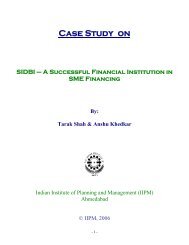
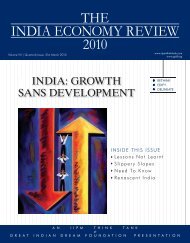
![[Feb 2008, Volume V Annual Issue] Pdf File size - The IIPM Think Tank](https://img.yumpu.com/43961117/1/190x245/feb-2008-volume-v-annual-issue-pdf-file-size-the-iipm-think-tank.jpg?quality=85)
![[June 2008, Volume V Quarterly Issue] Pdf File size - The IIPM Think ...](https://img.yumpu.com/41693247/1/190x245/june-2008-volume-v-quarterly-issue-pdf-file-size-the-iipm-think-.jpg?quality=85)
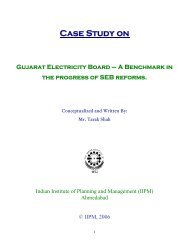
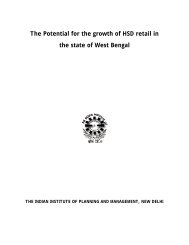
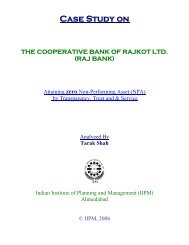
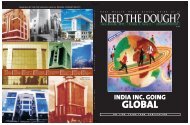
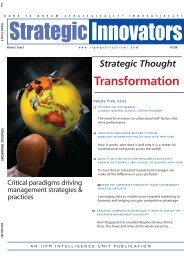
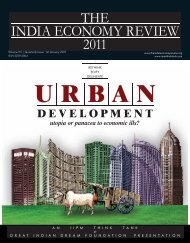
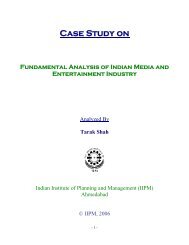
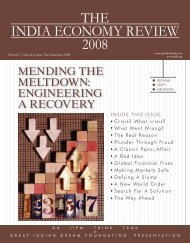
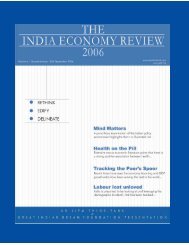
![[Volume VI | Quarterly Issue: 31st May 2009] Pdf File size](https://img.yumpu.com/27796051/1/190x245/volume-vi-quarterly-issue-31st-may-2009-pdf-file-size.jpg?quality=85)